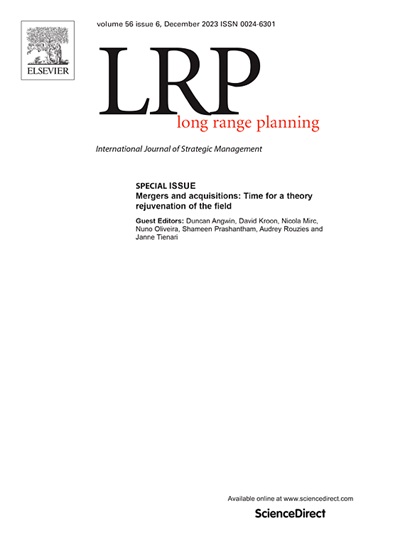How does digital new venture's customer orientation enhance strategic agility? The roles of strategic learning
IF 6.3
2区 管理学
Q1 BUSINESS
引用次数: 0
Abstract
The existing literature highlights the importance of customer orientation in enhancing strategic agility. However, certain studies have highlighted the adverse effects of customer orientation, particularly for resource-limited digital new ventures. This study aims to reconcile these divergent views by differentiating strategic agility into two dimensions: entrepreneurial agility and adaptive agility. This study attributes the varying effects of customer orientation on these two types of strategic agility to different mediating roles of strategic learning. While strategic learning enhances entrepreneurial agility, it has an inverted U-shaped impact on adaptive agility. Furthermore, the study suggests that market turbulence moderates the effects of customer orientation. Survey data from Chinese digital new ventures supports the hypotheses. This research contributes to the agility literature by proposing strategic learning as an internal mechanism through which customer orientation influences strategic agility. It also highlights the impacts of external environmental conditions. The theoretical framework provides a harmonious explanation for the contrasting effects of customer orientation, offering valuable managerial insights for improving strategic agility.
数字化新创企业的客户导向如何增强战略敏捷性?策略学习的作用
现有文献强调了客户导向在提高战略敏捷性中的重要性。然而,某些研究强调了以客户为导向的不利影响,特别是对于资源有限的数字新企业。本研究旨在通过将战略敏捷性分为创业敏捷性和适应性敏捷性两个维度来调和这些不同的观点。本研究将顾客导向对两类战略敏捷性的不同影响归因于战略学习的不同中介作用。战略学习对创业敏捷性有促进作用,对适应敏捷性有倒u型影响。此外,研究表明,市场动荡会调节客户导向的影响。来自中国数字新创企业的调查数据支持了这些假设。本研究通过提出战略学习是客户导向影响战略敏捷性的内部机制,为敏捷性文献做出了贡献。它还强调了外部环境条件的影响。该理论框架为客户导向的对比效应提供了一个和谐的解释,为提高战略敏捷性提供了有价值的管理见解。
本文章由计算机程序翻译,如有差异,请以英文原文为准。
求助全文
约1分钟内获得全文
求助全文
来源期刊

Long Range Planning
Multiple-
CiteScore
13.00
自引率
7.10%
发文量
75
期刊介绍:
Long Range Planning (LRP) is an internationally renowned journal specializing in the field of strategic management. Since its establishment in 1968, the journal has consistently published original research, garnering a strong reputation among academics. LRP actively encourages the submission of articles that involve empirical research and theoretical perspectives, including studies that provide critical assessments and analysis of the current state of knowledge in crucial strategic areas. The primary user base of LRP primarily comprises individuals from academic backgrounds, with the journal playing a dual role within this community. Firstly, it serves as a platform for the dissemination of research findings among academic researchers. Secondly, it serves as a channel for the transmission of ideas that can be effectively utilized in educational settings. The articles published in LRP cater to a diverse audience, including practicing managers and students in professional programs. While some articles may focus on practical applications, others may primarily target academic researchers. LRP adopts an inclusive approach to empirical research, accepting studies that draw on various methodologies such as primary survey data, archival data, case studies, and recognized approaches to data collection.
 求助内容:
求助内容: 应助结果提醒方式:
应助结果提醒方式:


